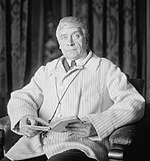Portal:Belgium/Selected article/2008
| This Wikipedia page has been superseded by Portal:Belgium and is retained primarily for historical reference. |
| Note: Did you know entries are now being transcluded directly on the main portal page. However, this page should be retained for historical reference. |
These articles have appeared on the Portal:Belgium page in 2008.

Count Maurice Maeterlinck (August 29, 1862 – May 6, 1949) was a Belgian poet, playwright, and essayist writing in French. He was awarded the Nobel Prize in Literature in 1911. The main themes in his work are death and the meaning of life.
In 1889, he became famous overnight after his first play, La Princesse Maleine, had received enthusiastic praise from Octave Mirbeau, the literary critic of Le Figaro. In the following years, he wrote a series of symbolist plays characterized by fatalism and mysticism, most importantly L'Intruse (The Intruder, 1890), Les Aveugles (The Blind, 1890) and Pelléas et Mélisande (1892). Nevertheless, his greatest contemporary success was the fairy play L'Oiseau Bleu (The Blue Bird, 1908). This play has been made into several films, including one in Technicolor from 1940, starring Shirley Temple, and the joint United States/Soviet Union production The Blue Bird (Russian: Sinyaya Ptitsa, 1976), starring Elizabeth Taylor.
According to an article published in the New York Times in 1940, he arrived in the United States from Lisbon. He had fled to Lisbon in order to escape the Nazi invasion of both Belgium and France. The Times quoted him as saying, "I knew that if I was captured by the Germans I would be shot at once, since I have always been counted as an enemy of Germany because of my play, 'Le Bourgmestre de Stillemonde,' which dealt with the conditions in Belgium during the German Occupation of 1918." He returned to Nice after the war and died there in 1949.
